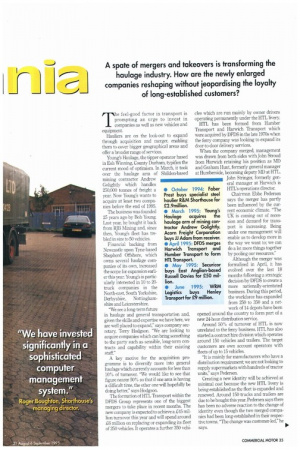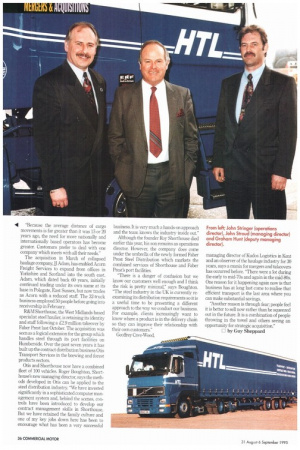A spate of mergers and takeovers is transforming the haulage
Page 37

Page 38

If you've noticed an error in this article please click here to report it so we can fix it.
industry. How are the newly enlarged companies reshaping without jeopardising the loyalty of long-established customers?
The feel-good factor in transport is prompting an urge to invest in companies as well as new vehicles and equipment.
Hauliers are on the look-out to expand through acquisition and merger, enabling them to cover bigger geographical areas and offer a broader range of services.
Young's Haulage, the tipper operator based in Esh Winning, County Durham, typifies the current mood of optimism. In March, it took over the haulage arm of Shildon-based mining contractor Andrew Golightly which handles 250,000 tonnes of freight a year. Now Young's wants to acquire at least two companies before the end of 1995.
The business was founded 25 years ago by Bob Young. Last year, he bought it back from RJB Mining and, since then, Young's fleet has tre bled in size to 50 vehicles.
Financial backing from Newcastle upon Tyne-based Shepherd Offshore, which owns several haulage companies of its own, increased the scope for expansion earlier this year. Young's is particularly interested in 10 to 20truck companies in the North-east, South Yorkshire, Derbyshire, Nottinghamshire and Leicestershire.
"We see a long-term future in haulage and general transportation and, given the skills and expertise we have here, we are well placed to expand," says company secretary, Terry Hodgson. "We are looking to acquire companies which can bring something to the party such as sensible, long-term contracts and capability within their existing staff."
A key motive for the acquisition programme is to diversify more into general haulage which currently accounts for less than 10% of turnover. "We would like to see that figure nearer 50% so that if one area is having a difficult time, the other one will hopefully be doing better," says Hodgson.
The formation of HTL Transport within the DFDS Group represents one of the biggest mergers to take place in recent months. The new company is expected to achieve a £45 million turnover this year and will spend around £6 million on replacing or expanding its fleet of 250 vehicles. It operates a further 350 vehi
des which are run mainly by owner drivers operating permanently under the HTL livery.
HTL has been formed from Humber Transport and Harwich Transport which were acquired by DFDS in the late 1970s when the ferry company was looking to expand its door-to-door delivery services.
When the company merged, management was drawn from both sides with John Stroud from Harwich retaining his position as MD and Graham Hunt, formerly general manager at Humberside, becoming deputy MD at HTL. John Stringer, formerly general manager at Harwich is HTL's operations director.
Chairman Ebbe Pedersen says the merger has partly been influenced by the current economic climate. "The UK is coming out of recession and demand for transport is increasing. Being under one management will enable us to develop more in the way we want to; we can do a lot more things together by pooling our resources."
Although the merger was formalised in April, it has evolved over the last 18 months following a strategic decision by DFDS to create a more nationally-orientated business During this period, the workforce has expanded from 250 to 350 and a network of 14 depots have been opened around the country to form part of a new 24-hour distribution service.
Around 50% of turnover of HTL is now unrelated to the ferry business HTL has also started a contract hire division which operates around 150 vehicles and trailers. The target customers are own account operators with fleets of up to 15 vehicles.
"It is mainly for manufacturers who have a distribution requirement; we are not looking to supply supermarkets with hundreds of tractor units," says Pedersen.
Creating a new identity will be achieved at minimal cost because the new HTL livery is being established as the fleet is expanded and renewed. Around 150 trucks and trailers are due to be bought this year. Pedersen says there has been no adverse reaction to the change of identity even though the two merged companies had been long-established in their respective towns. "The change was customer-led," he says • "Because the average distance of cargo movements is far greater than it was 15 or 20 years ago, the need for more nationally and internationally based operators has become greater. Customers prefer to deal with one company which meets with all their needs."
The acquisition in March of collapsed haulage company, JJ Adam, has enabled Acorn Freight Services to expand from offices in Yorkshire and Scotland into the south east. Adam, which dated back 60 years, initially continued trading under its own name at its base in Polegate, East Sussex, but now trades as Acorn with a reduced staff. The 32-truck business employed 50 people before going into receivership in February.
R&M Shorthouse, the West Midlands-based specialist steel haulier, is retaining its identity and staff following a £2.9 million takeover by Faber nest last October. The acquisition was seen as a logical extension for the group which handles steel through its port facilities on Humberside. Over the past seven years it has built up the contract distribution business Otis Transport Services in the brewing and forest products sectors.
Otis and Shorthouse now have a combined fleet of 100 vehicles. Roger Boughton, Short. house new managing director, says the methods developed in Otis can be applied to the steel distribution industry. "We have invested significantly in a sophisticated computer management system and, behind the scenes, controls have been introduced to develop our contract management skills in Shorthouse. But we have retained the family culture and one of my key jobs down here has been to encourage what has been a very successful business. It is very much a hands-on approach and the team knows the industry inside out."
Although the founder Roy Shorthouse died earlier this year, his son remains as operations director. However, the company does come under the umbrella of the newly formed Faber Prest Steel Distribution which markets the combined services of Shorthouse and Faber Prest's port facilities.
"There is a danger of confusion but we know our customers well enough and I think the risk is pretty minimal," says Boughton. "The steel industry in the UK is currently reexamining its distribution requirements so it is a useful time to be presenting a different approach to the way we conduct our business. For example, clients increasingly want to know where a product is in the delivery chain so they can improve their relationship with their own customers."
Geoffrey Cave-Wood, managing director of Kudos Logistics in Kent and an observer of the haulage industry for 30 years, says a mania for mergers and takeovers has occurred before. "There were a lot during the early to mid-70s and again in the mid-80s. One reason for it happening again now is that business has at long last come to realise that efficient transport is the last area where you can make substantial savings.
"Another reason is through fear; people feel it is better to sell now rather than be squeezed out in the future. It is a combination of people throwing in the towel and others seeing an opportunity for strategic acquisition."




















































































































